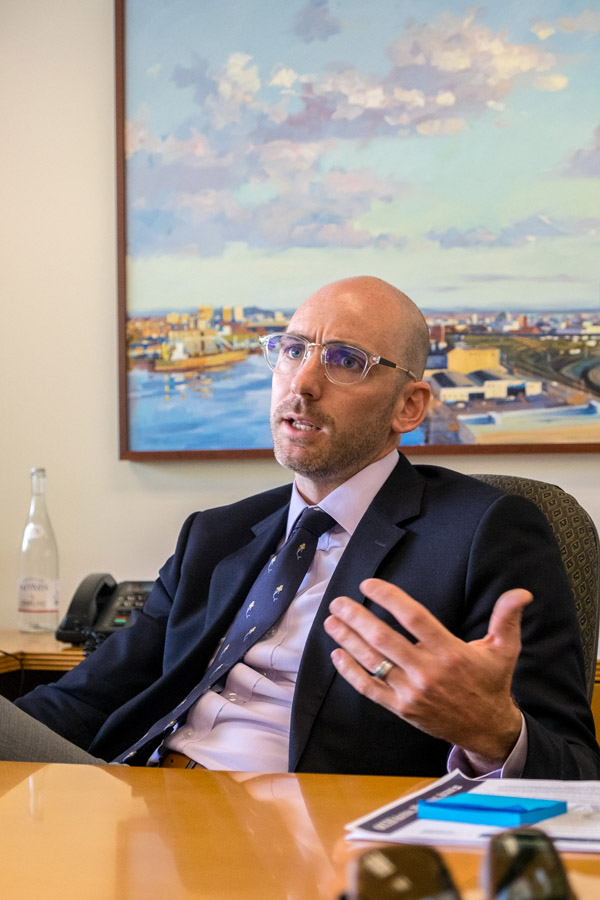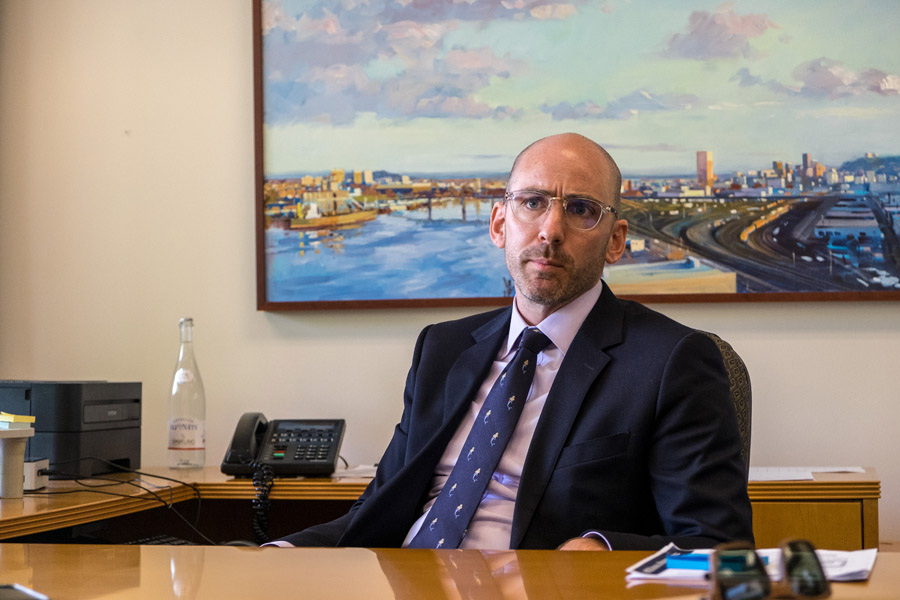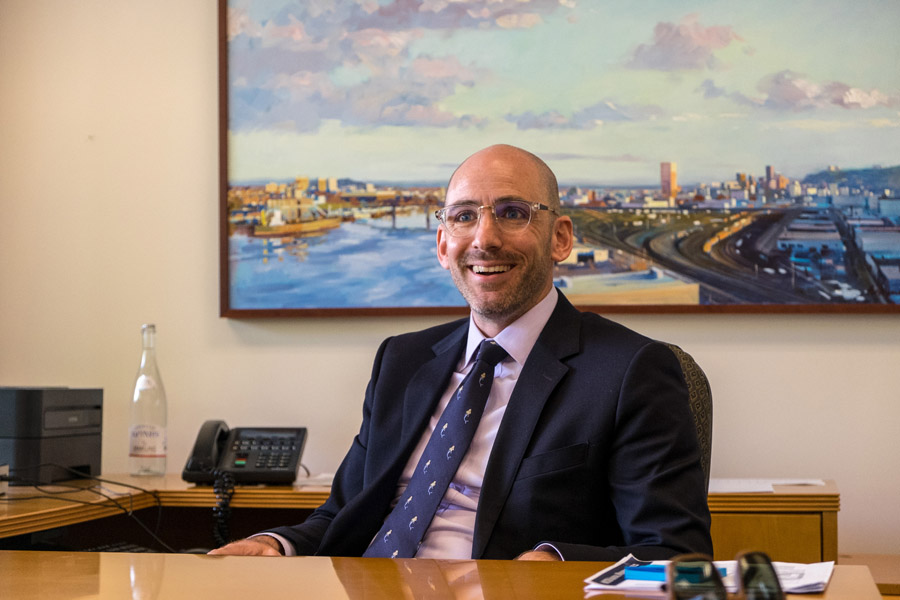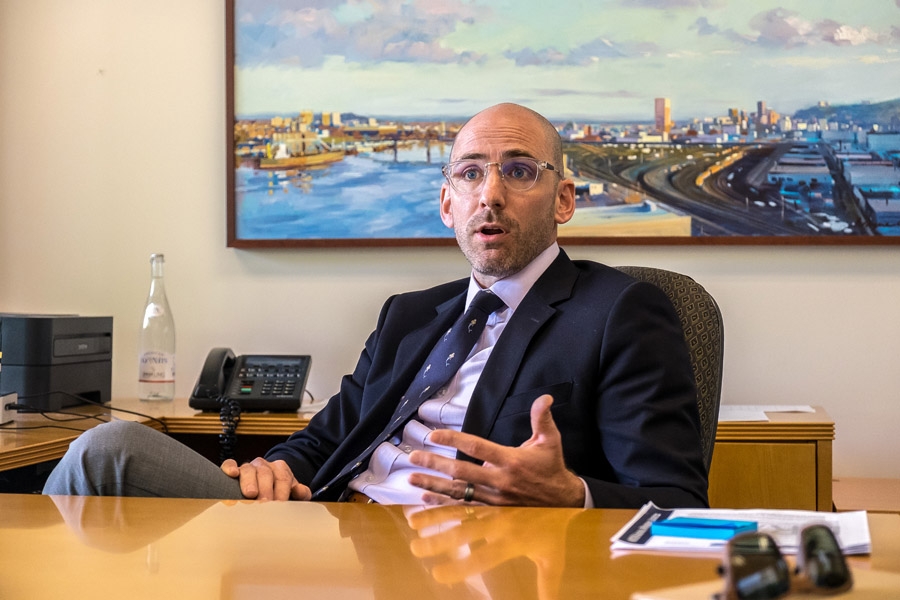A conversation with Andrew Hoan, the new president and CEO of the Portland Business Alliance.
After running the city’s flagship business association for 14 years, Sandra McDonough stepped down in June. Her replacement, Andrew Hoan, is the former chief of the Brooklyn Chamber of Commerce. Hoan, 37, marks a turning point for the Portland Business Alliance, a mainstream business organization now contending with myriad social problems like the city’s homelessness crisis. The chamber also faces competition from Business for a Better Portland, a new progressive group.
In an interview with Oregon Business, Hoan came across as energetic and ready to innovate — but he was also careful not to rock the boat on issues that are important to PBA’s core constituency. He talks about where the chamber goes from here, affordable housing and why river taxis deserve serious consideration as a commuter transportation solution. (Interview excerpts have been edited for length and clarity.)
On PBA’s position in the community
To think the Portland chamber is 150 years old — that sends a clear message that PBA has played a pivotal role in the development of the city, region and state. PBA’s influence translates into serious, impactful policy. So the organization is on an absolutely rock solid foundation. [PBA celebrates its sesquicentennial anniversary in 2020.]
Where PBA goes from here
PBA is at an inflection point, and that’s where I come in. There is a collective desire to ask the obvious questions about what’s next. It is a good opportunity to start engaging the staff, our board, members and partners across the region, as well as folks who may not think of us favorably, to say: “Who should the Portland Business Alliance be?”
On creating a new vision
We are launching a strategic planning process that will carry on to our annual meeting and will produce a vision for the next 3-5 years.

On relationships with other business associations
Our relationship with Oregon Business and Industry and the Oregon Business Council is marrow deep. They are thoughtful leaders, passionate about what they do. That story should be clear that the relationship between the three principal business entities of the state has never been stronger and it will continue as such.
On competition from Business for a Better Portland
BBPDX — there are far more commonalities than differences. That is a fact. I am personally and a lot of our members and board are excited about seeing where we can work together on issues. We are all driving toward one thing and that’s jobs. Jobs. Jobs. Jobs. The more we can do as a collective, the more we can make things happen.

On PBA’s support for the Jordan Cove Liquefied Natural Gas project
I’m not immune to people’s opinion on that. We do our best as any membership-based organization to thread the needle on projects that can be challenging to get behind or endorse. That’s what happened with Jordan Cove. Looking forward, we are going to play a continued role in the Oregon Business Plan. That’s where the genesis of that project came from.
RELATED COVERAGE: AN UNSTEADY STATE: OREGON BUSINESS ASSOCIATIONS DIVIDE, MERGE AND MULTIPLY
On Portland as a business-friendly city
The proof is in the pudding. This economy is expanding and creating jobs. What is more fascinating about job-creating trends is what you’re seeing in the growth of the small business community. We’re not just talking about tech. It’s food, beer, tourism, travel. And health care. It’s a business-friendly city because business is doing very well here.
On his top priorities
First and foremost is the street homeless population here. What is happening the street here is not OK. It is not OK to have people who are chemically addicted or developmentally disabled to be on the street. It’ s something I care about; it’s something this organization and the entire community cares about.
On replicating the Brooklyn chamber’s microlending program [In his previous position, Hoan launched Brooklyn Alliance Capital, a loan fund for minority and immigrant entrepreneurs.]
A check cut to an immigrant-owned business in a low to moderate income community — it’s hard to describe how powerful that is. I don’t know if it’s the character or DNA of our organization. But that sort of innovative programming that challenges the assumptions of what a traditional business group can do is something I hope I can bring to the table.
On diversity, equity and inclusion
My event team needed some iPads. I said: We will have to source those iPads from a member and from a minority or women-owned business. Because the conversations around diversity, equity and inclusion are absolutely critical, but putting money where your mouth is is also critical. So we will be experimenting throughout the year to figure out how we can give in our expense budget opportunities to minority- and women-owned certified firms.
On synergy between government and business
The story about the interrelatedness between government and business community doesn’t get enough attention. One of the instructive early lessons I had was the creation of the most recent round of funding that the city and county came together on, for the permanent supportive housing project. You have a single point of entry for the development community to create affordable housing with wrap-around services. That was an idea that came out of the business community that the leadership of the city responded to and created a smart sensible policy to solve a priority issue.

On metro-area traffic
It is a symptom of a good problem, which is growth. Congestion remains a major issue for the workforce, and the workforce powers the companies that are here. So coming up with extremely sensible solutions to the issues of congestion and lost productivity and sitting in cars — and, frankly, sitting in bike lanes and being backed up in traffic — is something we are going to have to contend with.
On congestion pricing
Value pricing, tolling — this is very curious subject matter that we’re going to have take a very deep look into. One thing I’ve repeatedly heard is commuter water service. I think it’s a great opportunity. I was an East River ferry commuter, and I can tell you it was one of the most dignified ways to get around in the mornings and evenings. Sailing up and down the East River of New York is wonderful, as the Willamette can be.
On personal commuting habits [Hoan lives with his wife and baby in the Pearl District.]
I drive my car to work. I bike to work. I walk to work. I’m an intermodal commuter.
On land use
We are not creating any more space downtown. I come from a place that had five or six downtowns. We’re going to have to look very hard at where are the future commercial centers of the city.
On the Portland-Brooklyn connection
What drives both of the cities is the seamless connectivity between arts and culture scene and the entrepreneurial world. Rediscovery and passion for being a business owner and entrepreneur — that’s the life blood of any city. World class performing arts, opera and dance, it’s all here. That’s the same in Brooklyn. The anchor institutions that drive Portland’s je ne sais quoi is really its cultural scene. Oh, and the food is outstanding here. I’ll just put that rejoinder on it.
To subscribe to Oregon Business, click here.


